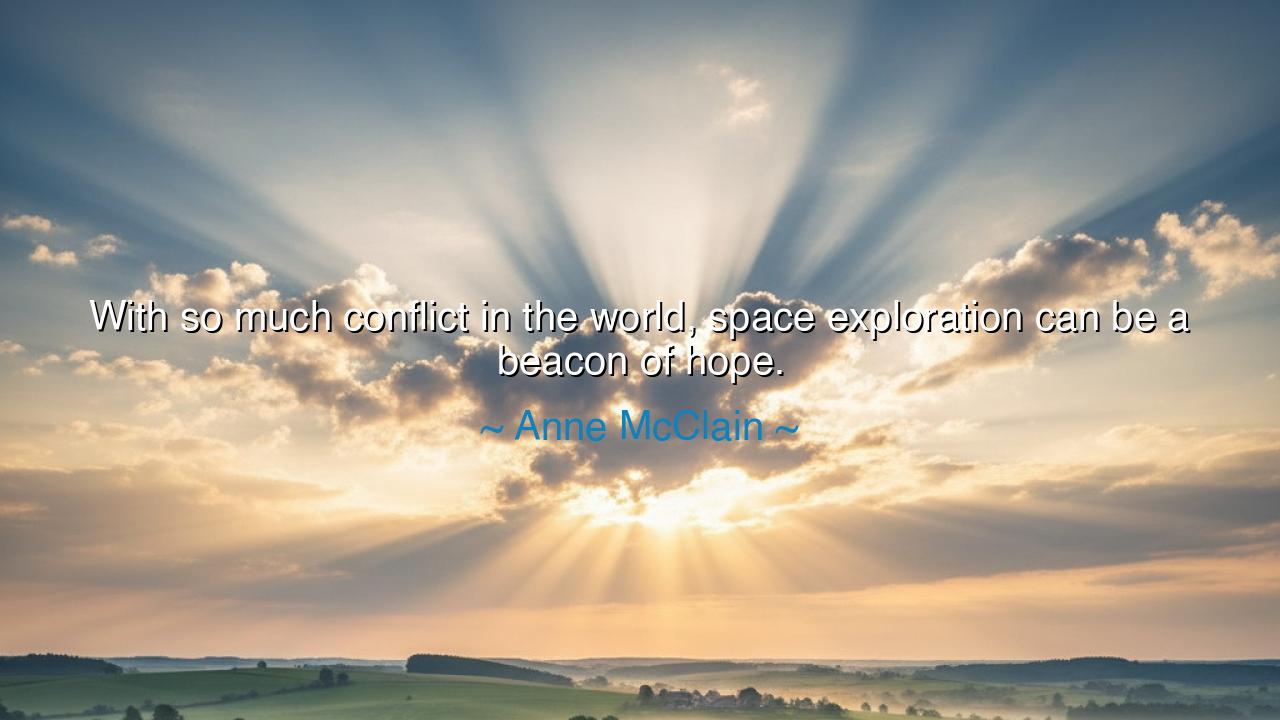
With so much conflict in the world, space exploration can be a






Hearken, O children of the Earth, and lift your eyes to the heavens, for Anne McClain, an explorer of the cosmos, has proclaimed: “With so much conflict in the world, space exploration can be a beacon of hope.” In these words lies a vision that spans both time and spirit, a reminder that amidst the strife of nations and the discord of humankind, the stars above offer guidance, inspiration, and a common dream that transcends earthly divisions. Space exploration becomes not merely a pursuit of knowledge, but a symbol of unity, courage, and the boundless potential of humanity.
Since the first gaze into the night sky, mortals have sought meaning among the stars. The ancients charted constellations to tell stories of gods, heroes, and the cycles of life. In every age, the heavens have inspired wonder, hope, and curiosity. McClain’s words remind us that in the vast expanse of the cosmos, there is a lesson: our petty conflicts are small against the infinite, and the act of reaching beyond ourselves is a call to collaboration, courage, and vision.
Consider the Apollo 11 mission, when humankind first set foot upon the Moon. Amidst the turmoil of the Cold War, political strife, and earthly divisions, astronauts walked on lunar soil. Millions on Earth, of differing nations and creeds, watched in awe as humanity touched a celestial body. In that moment, space exploration became a beacon, a shared triumph that transcended borders and reminded the world of what is possible when courage, ingenuity, and hope align.
The power of space lies not only in achievement, but in perspective. From orbit, the Earth appears as a fragile sphere, without borders, without conflict, floating in the vast silence of the universe. McClain’s reflection suggests that such perspective can be transformative, teaching us that cooperation, rather than discord, is our path forward. The act of exploration demands teamwork, trust, and shared purpose—the very virtues that conflict often denies us.
In another example, the International Space Station, a joint venture of multiple nations, demonstrates the unifying potential of space exploration. Scientists and astronauts from distant lands work together daily, transcending politics, culture, and ideology. Here, in orbit, humanity cooperates for knowledge and survival, a living testament to hope amidst a world too often fractured by misunderstanding and strife.
O seeker, learn from this wisdom. Look beyond the conflicts and struggles of daily life, and seek endeavors that elevate the spirit and unite hearts. Support collaboration, pursue knowledge, and lift your gaze to the wider universe, where the smallness of human quarrels is tempered by the grandeur of possibility. Inspiration often comes from the vast, the unknown, and the challenging. Space exploration, in this sense, is both literal and metaphorical: it calls us to rise above pettiness, to dream together, and to create a better world.
The lesson endures: amidst turbulence and strife, hope may be found in the pursuit of great and noble endeavors. McClain reminds us that we are capable of transcendence, that the stars are not just distant bodies, but mirrors of our own potential for courage, wisdom, and unity. By reaching outward, we inspire the inward growth of cooperation, empathy, and purpose.
Thus, let Anne McClain’s words resound across generations: space exploration is a beacon of hope, a symbol of what humanity can achieve when it dares to look beyond conflict, to collaborate, and to dream. Let each of us embrace this vision in our own lives: pursue knowledge, seek unity, inspire others, and reach for the stars—not only in the heavens, but in the hearts and minds of humankind.
If you wish, I can also craft a short illustrative story showing how a young person inspired by space exploration learns hope and cooperation, making McClain’s vision vivid for listeners. Would you like me to do that?






AAdministratorAdministrator
Welcome, honored guests. Please leave a comment, we will respond soon